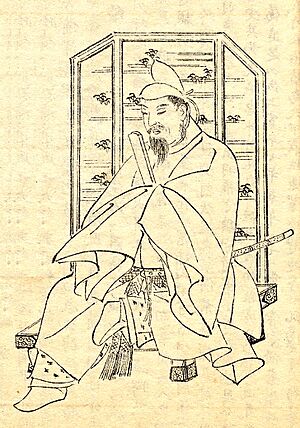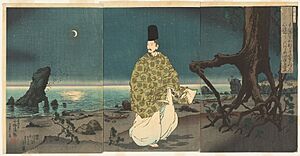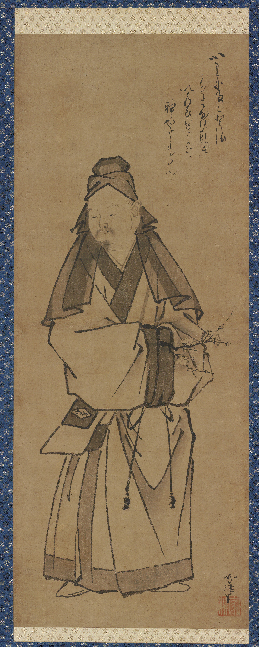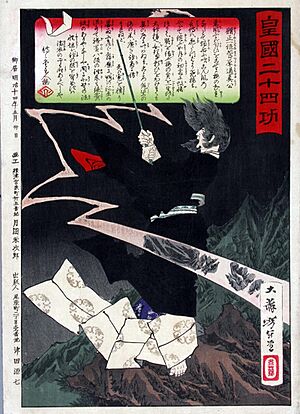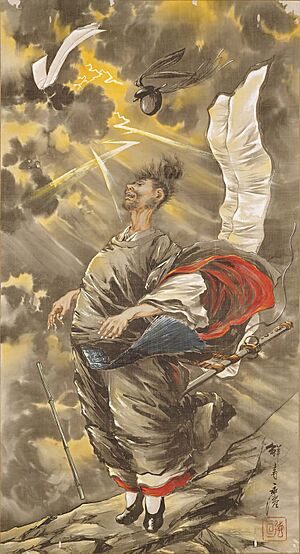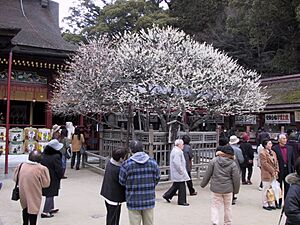Sugawara no Michizane facts for kids
Sugawara no Michizane (born August 1, 845 – died March 26, 903) was a very smart scholar, a talented poet, and an important politician in Japan during the Heian period. He was known for his amazing poems, especially waka and kanshi. Today, people in Shinto religion honor him as the god of learning, known as Tenman-Tenjin or simply Tenjin. In a famous poem collection called Hyakunin Isshu, he is called Kanke. In kabuki plays, he is known as Kan Shōjō.
Contents
A Scholar's Life: Sugawara no Michizane
Michizane was born into a family of scholars. His family had a special old title called Ason. This title was given to important families even before the government system of ranks started.
His grandfather, Sugawara no Kiyotomo, worked for the court. He taught history to future government workers and reached a high rank. Michizane's father, Sugawara no Koreyoshi, started a private school at his home. He taught students who wanted to join the national school or become court officials, including his own son, Michizane.
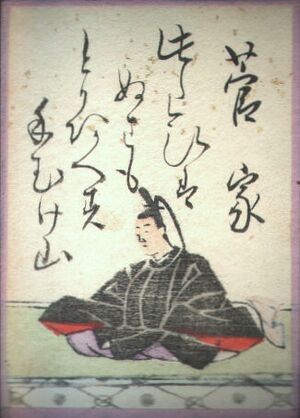
Michizane passed his entrance exam and joined the national academy, called Daigaku. In 870, he started his career in the court as a scholar. He began as a minor official in the government. By 874, he had moved up to a higher rank. He worked in different government departments, including the Ministry of War and the Ministry of Popular Affairs.
Michizane was very skilled in Classical Chinese language and literature. This helped him write important letters and documents for court officials and even the Emperor. He also helped welcome visitors from the Kingdom of Parhae, where his Chinese language skills were very useful for talking and sharing poems. In 877, he was given a role in the Ministry of Ceremonial. This allowed him to focus more on education and intellectual matters.
Besides his work at the court, Michizane also ran his father's school, called the Kanke Rōka (meaning "Sugawara Family Hall"). In 877, he became a professor of literature at the academy. Later, he was named Doctorate of Literature, which was the highest teaching position at Daigaku. This was a great honor for any historian.
Michizane's Early Career as Governor
In 886, Sugawara no Michizane was sent to be the governor of Sanuki Province. Many government workers who were not yet famous were often sent to work in faraway provinces. Michizane was one of them. During his four years there, he wrote many poems. About a quarter of all his poems that we still have today were written during this time.
His duties included traveling around the province. He would suggest good people for the court and give punishments when needed. In 887, Michizane had to pray to the Buddhas and Shinto gods to help end a drought. Records from that time suggest his time as governor was moderately successful.
Michizane's Conflict with the Fujiwara Clan
While Michizane was a governor, a political problem happened between Emperor Uda and Fujiwara no Mototsune. This was called the Akō Incident in 888. It was about Mototsune's unclear role in the court after Emperor Uda became emperor. Michizane supported the court scholars and sent a letter criticizing Mototsune. This made Emperor Uda like Michizane more.
When his time as governor ended in 890, Michizane went back to Kyoto. Emperor Uda was trying to get more power back for the imperial family, away from the powerful Fujiwara family. So, he promoted many officials who were not from the Fujiwara family, including Michizane. Starting in 891, Michizane quickly rose through the ranks. By 897, he reached a very high position.
In 894, Michizane was chosen to be the ambassador to China. However, he suggested that Japan should stop sending ambassadors to China. He said this was because the Tang dynasty in China was becoming weaker. Some historians also think he might have wanted to stay in Japan to avoid being away from the center of power. He had rivals like Fujiwara no Tokihira who might have wanted him out of the way.
When Emperor Uda stepped down, Michizane's position became weaker. In 901, his rival, Fujiwara no Tokihira, accused him of supporting a different prince for the throne. Because of this, Michizane was sent away from Kyoto. He was demoted to a minor official job in Dazaifu, in Kyūshū. His whole family was also sent into exile with him. He died in exile in 903.
Michizane Becomes a God
After Michizane died, many bad things happened. There was a plague and a drought. The sons of Emperor Daigo died one after another. Lightning repeatedly struck the Imperial Palace's Great Audience Hall. The city also had weeks of rainstorms and floods.
People believed these events were caused by the angry spirit of Sugawara no Michizane, who had been unfairly sent away. So, the imperial court built a Shinto shrine called Kitano Tenman-gū in Kyoto to honor him. They also gave him back his old titles and positions after his death. They even removed any mention of his exile from official records.
But this was not enough. Seventy years later, Sugawara was made a god, called Tenjin-sama, the god of sky and storms. Over time, Tenjin became a kind and helpful god of scholarship and learning.
Today, many Shinto shrines across Japan are dedicated to him. Michizane is a famous example of how a vengeful spirit, called an onryō or goryō, can become a kind god through special ceremonies and honors after their death.
Michizane's Poetry
Michizane was incredibly talented at writing poetry. He wrote both waka (poems in Japanese) and kanshi (poems in Chinese).
Like his father, Michizane loved poetry. It is said he started writing waka when he was just five years old. His waka poems appeared in many important collections. These collections were put together by emperors. His poems can be found in famous books like the Kokin Wakashū and the Shin Kokin Wakashū.
One of his waka poems was included in Fujiwara no Teika's famous collection, Ogura Hyakunin Isshu:
| Japanese | Rōmaji | English translation |
|
このたびは |
Kono tabi wa |
On this journey |
This poem was originally the 420th poem in the Kokin Wakashū.
Another one of his famous waka poems was written in 901. This was just before he left Kyoto for Daizaifu because he was sent into exile. He was very sad that he would never see his beloved plum tree at his home in Kyoto again. So, he spoke to the tree with great affection:
| Japanese | Rōmaji | English translation |
|
東風吹かば |
Kochi fukaba |
When the east wind blows, |
There's a romantic legend that says the plum tree loved its master so much that it flew all the way to Dazaifu. That tree is now known as tobi-ume, or 'the flying plum', at Dazaifu Tenman-gū. A more realistic story says that Michizane or a friend planted a seedling of the tree in Dazaifu.
Michizane was also very interested in kanshi (Chinese poetry). At that time, knowing a lot about Chinese culture showed how educated and refined a person was. Because he was so good at kanshi, Emperor Daigo asked him to put his Chinese poems together. So, in 900, Michizane published Kanke Bunsō (meaning "Chinese poetry by Sugawara no Michizane") and gave it to the emperor. Even after he was sent away, he kept writing kanshi. He collected them into Kanke Kōshū (meaning "later anthology of Sugawara no Michizane"). This book had 46 kanshi poems and was finished just before he died in 903.
Honors and Family
Michizane was given the highest rank, Senior First Rank, after his death on June 12, 993.
Michizane had descendants, and some famous families in Japan, like the Maeda clan and Yagyū clan, claimed to be related to him.
See also
- Kitano Tenman-gū
- Dazaifu Tenman-gū
- Yushima Tenman-gū
- Hattori Tenjin-gū: Michizane stopped here during a trip to Fukuoka because of a leg problem. It is said he was cured here.
- Tenjin is also honored in July at two floats, Abura Tenjin Yama and Arare Tenjin Yama, during Kyoto's famous Gion Festival.
- Taira no Masakado: Another important person from Japan's past who, like Michizane, became a guardian spirit after his death.
 | Victor J. Glover |
 | Yvonne Cagle |
 | Jeanette Epps |
 | Bernard A. Harris Jr. |


